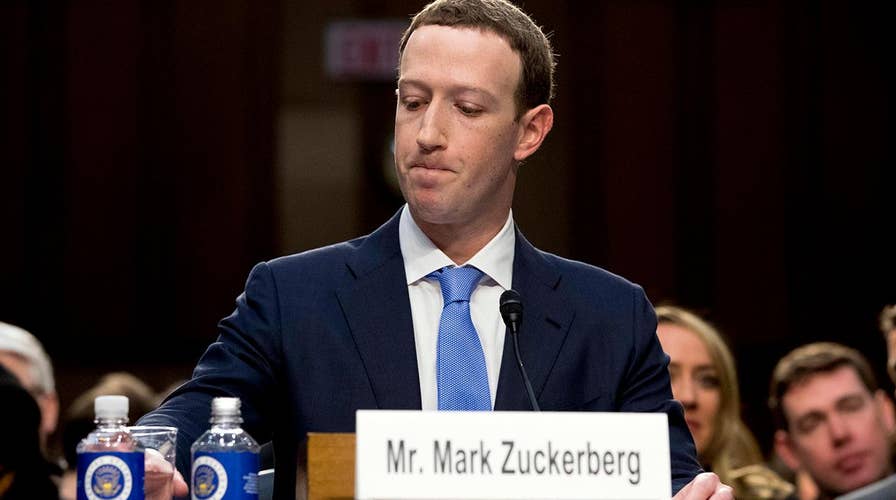Facebook CEO takes questions on Capitol Hill
Mark Zuckerberg says he's open to making changes to Facebook and the tech CEO says the buck stops with him; chief congressional correspondent Mike Emanuel reports from Capitol Hill.
Ongoing resentment over Donald Trump’s presidency continues to create hysteria among Democrats. Like the boogeyman, Facebook is the latest source of “Russian collusion” ire, and on Tuesday it emerged from the shadows.
In a five-hour marathon of a Senate hearing, Senators such as Orrin Hatch, R-Utah, revealed how little they actually know about Facebook. Despite having plenty of time to prepare with staffers, Hatch incredulously didn’t know how the world’s largest social media platform made money. (Hint for those unfamiliar with the 21st Century: advertising).
Hatch wasn’t alone. The longest-serving GOP senator’s peers were equally as uninformed regarding the most popular social media platform in the world. Eighteen-year-olds, with the swipe of a touch screen, could tell you far more about Facebook than this country’s senior politicians.
This was the sad state of affairs given that millennials – the largest generation since the baby boomers – and up-and-coming Generation Z voters share a penchant for technology.
Eighteen-year-olds, with the swipe of a touch screen, could tell you far more about Facebook than this country’s senior politicians.
Yet with nothing, senators were entrusted to find something. The hearing centered on the ongoing Cambridge Analytica scandal, involving a pro-Trump consulting firm that reportedly mined the data information of 87 million Facebook users.
The hearing also examined Facebook’s role and responsibility as a pre-eminent world news source capable of enhancing or degrading democracy.
All of that is fair game. Questions should be asked and Mark Zuckerberg deserved to face the music (or in reality, a sea of photographers on Capitol Hill). But guess what? That should have happened when Barack Obama was elected as our 44th president in 2008.
In 2008, the Obama campaign’s use of Facebook took on a completely different narrative in the media than Donald Trump’s. Barack Obama was depicted as the “cool” politician savvy to the Internet.
In fact, a U.S. World & News Report story carried the headline “Barack Obama and the Facebook Election,” with the first paragraph proclaiming: “The Presidential election of 2008 will go down in history for an obvious symbolic reason that will inspire future generations. Yet while pundits were focused on Barack Obama’s race, another largely overlooked factor in his success was his powerful techno-demographic appeal.”
I doubt the article’s use of “inspired,” foresaw a mob of pitchfork-wielding media members obsessed with Russian conspiracy theories in 2018. It’s also unlikely the depiction of one president’s “techno-demographic appeal” would later lead to a congressional hearing held, in part, to diminish another president’s electoral victory.
But here we are – a far cry from the public perception of President Obama’s 2012 re-election campaign that took advantage of the same Cambridge data mining concepts.
Journalist Sasha Issenberg wrote about how the Obama campaign’s “‘targeted sharing’ protocols mined an Obama backer’s Facebook network in search of friends the campaign wanted to register, mobilize, or persuade.”
Yet somehow, President Obama managed to quietly escape bad press and scandal.
Let’s be clear: I’m not defending distributing individuals’ personal data for political gain. But we have to acknowledge that those practices occurred long before Trump ran for office, and will likely continue long after, if Facebook’s reach isn’t mitigated.
Every time you log into a third party app on Facebook – whether for the latest inane celebrity quiz or to buy sheep in Farmville – the reality is that you’re being played as a sheep, mindlessly sending out your personal email and information about yourself.
But that wasn’t the picture Zuckerberg painted in his congressional testimony. He championed his $63 billion company in liberal-loving terms of openness and connectivity.
But in truth, Facebook’s end goal is far less altruistic. It makes money off of you. Facebook is a conveyor belt of data to advertisers, targeted by the details in a user’s profile. This is the core of Facebook’s business model.
So stop saying Cambridge or any other third-party application is an isolated problem associated with just one side of the political spectrum.
If anything, Facebook has often leaned against conservatives and Republican voters by removing posts or shutting down popular pundit pages. When asked about this perceived bias by Sen. Ted Cruz, R-Texas, Zuckerberg acknowledged it was a “fair concern.”
Zuckerberg took a step in accountability on Capitol Hill. If the country could do the same by acknowledging who rightfully won the 2016 presidential election, perhaps America, like Facebook, can also move towards a better future.









































